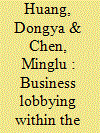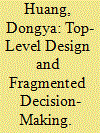| Srl | Item |
| 1 |
ID:
171086


|
|
|
|
|
| Summary/Abstract |
Most existing scholarship regards private businesspeople in China as allies of the party-state, without considering how the private sector’s policy influence is possible in an authoritarian state where the political elites dominate the policy-making process. Based on the large number of successful proposals that the All-China Federation of Industry and Commerce (ACFIC) has submitted to the Chinese People’s Political Consultative Conference, this study reveals the rising policy influence of private businesspeople in the past decade. It finds that their influence on government policy is not realized simply through collusion or informal ties with local governments at the stage of policy implementation. Instead, they now can voice their interests and exert influence as a group in national policy making at the central level through formal institutional channels. In recent years the influence of business associations affiliated with the ACFIC has been increasing, mainly due to institutional changes at the national level that encompass their input. This entails political co-optation that helps empower the private sector to exert influence on policy, rendering it unnecessary for the business community to challenge the political system from the bottom up.
|
|
|
|
|
|
|
|
|
|
|
|
|
|
|
|
| 2 |
ID:
143771


|
|
|
|
|
| Summary/Abstract |
The revolving door of private entrepreneurs in China is considered to be a crucial strategy of the Chinese Communist Party to adapt to the market transition and contributes much to the compliance of private entrepreneurs. However, based on the data from the official National Survey on Private Enterprises in 2006, this article finds that the Xiahai entrepreneurs revolving out of the Party-state were significantly and robustly more confrontational than those without state employment backgrounds. We argue that the unique path of the market transition in China makes the former political and economic elites more confrontational and has a significant effect on who might turn into potential challengers of the current regime among the economically powerful social class.
|
|
|
|
|
|
|
|
|
|
|
|
|
|
|
|
| 3 |
ID:
169967


|
|
|
|
|
| Summary/Abstract |
State-owned enterprise (SOE) reforms have typically been considered the result of bargaining under China’s fragmented bureaucratic structure. This study uses the case of the CNR–CSR merger to investigate the latent changes that have recently occurred in the policy-making structure of SOE reforms. This study will demonstrate that ‘top-level design’—in the context of a strengthened political authority and centralised political power—dominates SOE reforms and changes the pattern of fragmented interest bargaining among government departments and SOEs. In this context, the national strategy can be implemented with little resistance, contradicting scholarly predictions of fragmented authoritarianism. However, the top-level design does not appear to be based on a rational decision-making process; rather, its goals are vague, and the methods for achieving them have not been debated rationally. The policy-making process in this case study involved figuring out the top-level leaders’ intentions and rationalising the decisions afterwards. A top-level design with weak rationality may have risky consequences.
|
|
|
|
|
|
|
|
|
|
|
|
|
|
|
|